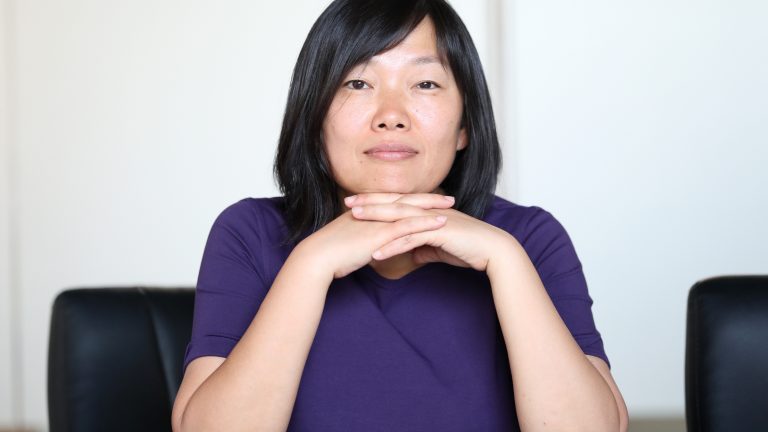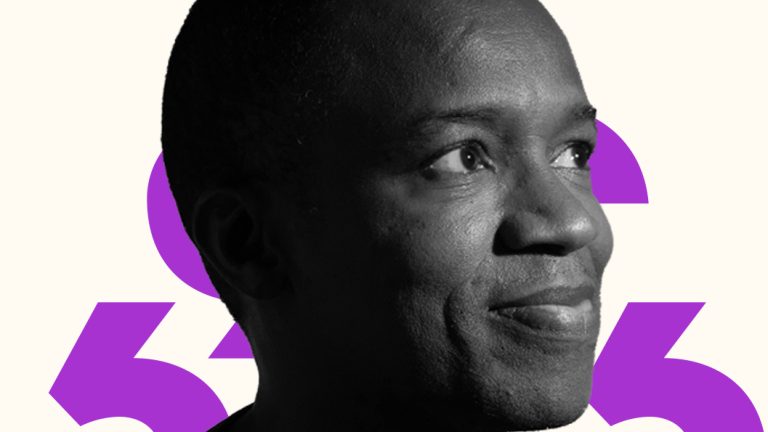Last year, as Russia faced a rising tide of coronavirus infections, Tatyana Bakalchuk stepped into the spotlight. Newly crowned as the country’s richest woman, the owner of online retail giant Wildberries released a video statement promising that digital merchants would rise to the challenge of lockdown.
Sitting alone on a large sofa with her hands clasped firmly in her lap, Bakalchuk outlined a set of rules for pandemic-era internet trading before attacking shopping malls and stores for their irresponsible approach to safety, arguing they should instead be repurposed as collection points for online orders. “Stay at home, and we’ll take care of you and your loved ones,” pledged the founder. “We’re a great country that has more than once gotten out of the most difficult situations.”
Such public leadership was a departure for the poetry-writing former English teacher. In her 16 years in business, Bakalchuk typically avoided media scrutiny and claimed in an interview last year that she aspired to a “quiet life.” But as Wildberries consolidates its position as Russia’s biggest online retailer — its unmissable pink-and-purple branding can be found from the Baltic Sea to the Pacific Ocean — she has stepped out of the shadows. In recent years, Bakalchuk has, among other things, appeared at business conferences, held public meetings with ministers, and even attended celebrity events in an attempt to boost her public profile. A Wildberries spokesperson, however, declined to answer questions for this article.
Wildberries is comfortably ahead in the cutthroat race to become Russia’s Amazon. The company has underwritten its growth by catering to low-income consumers via offline collection points, free delivery, and rolling discounts. And the coronavirus pandemic has only strengthened its lead. With almost a million orders a day, Wildberries all but doubled its payroll last year and quadrupled the size of its supplier network to almost 80,000 firms and individuals. While real estate tycoon Elena Baturina officially reclaimed her title as Russia’s richest woman in 2020, Forbes magazine has suggested that Bakalchuk’s personal fortune could be as much as $10 billion.
Bakalchuk has described how she set up the company a month after giving birth in 2004, while still suffering from postpartum depression. “I didn’t want to be known as just ‘someone with a child,’” she said in her first-ever video interview 14 years later. “I tried to return to what I was doing previously — I was a foreign-language tutor — but it didn’t work out because, of course, my child didn’t care about my schedule.” Instead, she invested $700 in a website that sold clothes, and a little more in online advertisements. When the first orders came in, she used her apartment as a makeshift warehouse and took public transport to deliver the packages herself. According to Bakalchuk, Wildberries has grown organically ever since.
This rags-to-riches origin story makes Bakalchuk highly unusual in Russia, where the state controls huge swathes of the economy, and the wealthy elite is almost entirely male. And it means Bakalchuk stands out from the country’s other billionaires, the majority of whom made their fortunes, directly or indirectly, from the extraction of mineral resources. Just like Wildberries’ name — chosen for its evocations of color and dynamism — Bakalchuk is seen as a breath of fresh air in Russia’s business world. Cultivating this persona has opened the doors of government ministers keen to cultivate homegrown business success and helped Bakalchuk win a following among members of the younger generation.
Despite its healthy lead in the e-commerce industry, Wildberries’ total dominance is far from guaranteed. The market in Russia is unusual because it consists almost entirely of local firms, including state-backed ventures, and is far more fragmented than its Western and Asian counterparts. Most experts believe the sector is on the brink of a turbulent period that will see the emergence of a few major players. “The market is moving toward consolidation because of rapid growth, not via mergers and acquisitions,” said Fedor Virin, co-founder of Russian e-commerce analysis firm Data Insight. Competition to come out on top is intense, pitting influential billionaires against state-owned financial behemoths.

Wildberries has repeatedly denied ever receiving any significant outside investment, but many in the Russian e-commerce world are deeply skeptical of Bakalchuk’s “self-made” rhetoric, pointing to the company’s phenomenal growth and powerful friends as evidence. In 2019, year-on-year sales rose 88%, and analysts predict it will be over 100% in 2020, rising more than 2.5 times faster than the market as a whole. Even competitors with significant investments struggle to grow at these rates, fueling rumors of a secret investor or high-level state support. “There are concerns that a road is being cleared for Wildberries,” said retail sector analyst Aleksei Petrovsky.
The company’s business tactics unquestionably play a major role in its popularity among Russia’s 95 million active internet users (the largest in Europe). Wildberries operates a huge network of over 14,700 collection centers in low-rent suburban areas that also function as mini-distribution points and provide customers with a place to try on their purchases. It provides free delivery and free returns and has historically focused on products with higher profit margins, like clothes and shoes, which, as of May 2020, accounted for over 50% of sales.
“The secret of successful online business in Russia is to be as little online as possible.”
A physical presence in towns and cities has, at least in the short term, helped Wildberries overcome the major hurdles facing other e-commerce companies in Russia: long delivery distances, scattered populations, a notoriously unreliable postal service, and a deep mistrust of upfront payment, a legacy of the turbulent transition from communism in the 1990s.
“The secret of successful online business in Russia is to be as little online as possible,” Dmitry Alekseev, co-owner of large electronics retailer DNS, told The Bell last May. “Wildberries has more offline outlets than we do.”

Wildberries’ success is also built in part on its 2014 decision to transition to an Amazon-style marketplace, in which suppliers are simply offered a platform to make sales. The company doesn’t have to sink its own money into products and is able to retain control of pricing, meaning it can pressure suppliers to offer big discounts. This policy has alienated some of the companies that work with Wildberries, which accuse the retail giant of forcing their hand. “If you only work with Wildberries, you can easily destroy the rest of the market for yourself,” said one supplier who requested anonymity.
Grabbing market share has long been the company’s overriding goal. “[They] were always compulsively drawn to growth. They sensed that if they were not developing rapidly, they would be caught, overtaken, and trampled into the ground,” recalled a former employee, who feared retaliation. Occasionally, growth was prioritized over profit. The decision to implement free deliveries, for example, initially hit the company’s bottom line.
As the company began to reach into households all over the country, and Bakalchuk attracted increasing interest from both the media and senior government officials, it was no longer possible to outright refuse interviews and dismiss the need for a PR department.
Around the start of 2018, Wildberries hired an external PR agency, which helped craft the tale of self-made female entrepreneurship, a narrative that Bakalchuk has since adopted as her origin story in interviews with top Russian media outlets. On the back of this carefully curated image of independence, however, the company has forged links in the heart of Moscow. One of Bakalchuk’s biggest cheerleaders is Trade and Industry Minister Denis Manturov, who has traveled with Bakalchuk on domestic business trips, announced major corporate decisions, and lobbied Wildberries’ interests abroad. And during the pandemic, Bakalchuk’s increasingly public reputation helped propel Wildberries to the top of Russia’s e-commerce sector.
-

-

Andrey Rudakov/Bloomberg/Getty Images
Bakalchuk’s neatly packaged origin story downplays some key details. For starters, she is not the only decision-maker at Wildberries. Vladislav Bakalchuk, her husband — a soft-spoken man who reportedly owns 1% of Wildberries — was a successful businessman in the early 2000s and received a windfall when the internet provider he’d partly owned was sold in 2007. He and bodybuilder Sergei Anufriev occupy key positions in Wildberries.
Anufriev played an especially intriguing role in the early days of the company, brokering a large delivery of Adidas-branded goods for Wildberries in the late-2000s, after several other buyers declined, according to the former Wildberries employee. Back then, many Russian retailers were dependent on unwanted stock from major Western brands, a sizeable portion of which was shipped into the country using false customs declarations (the Russian Central Bank estimated in 2005 that these “gray imports” constituted as much as 20% of all imports).
While the extent of Anufriev’s influence today is unclear, the heavily discounted Adidas items were the backbone of Wildberries’ catalogue during a crucial growth period for the company. Several years later, reputable Russian media outlets repeatedly identified Anufriev as a co-owner of Wildberries. And the former Wildberries employee, who requested anonymity to speak freely, said that, when he worked at the company in 2010, “Tatyana was in charge of the everyday matters … [and] if she objected to Anufriev, he always answered ‘I’ve already said: we’re doing it like this.’ And everybody did that.”
Wildberries also stands out because of its close family ties. It’s unclear exactly how many relatives Tatyana and Vladislav Bakalchuk employ, but most appear to come from Tatyana’s side of the family, which is part of Russia’s Koryo-saram population of ethnic Koreans. In press interviews, Bakalchuk, who has four children, described how her father, aunt, and younger sister were all recruited to help. Her sister, Marina Andreeva, has been employed by the company since its early years and launched a short-lived line of Wildberries-branded goods, according to the former staff member. Another relative, Maksim Kim, and his wife, Nadezhda Kim, were also on Wildberries’ payroll, according to their social media profiles.
This tight-knit office culture and low staff turnover may contribute to skepticism about Wildberries’ “self-made” PR narrative, which has insulated it from deeper scrutiny. It has also helped shut down questions about possible undisclosed investments and the high level of state support that the company enjoys. There is less industry understanding of the company, compared to its major rivals, according to Alexander Ivanov, the president of Russia’s National Association of Distance Trading, and when a business is secretive and insulated, rumors are quick to take hold. “Good employees are constantly circulating between the other [e-commerce] companies … but from the very beginning, Wildberries had this idea to build their business like a family, and many top managers were nurtured from within,” said Ivanov. Several former employees said they felt uncomfortable speaking publicly about their experiences at Wildberries.

Wildberries, for its part, seems uninterested in opening itself up further to the outside world and offering more transparency. Bakalchuk has said repeatedly she sees no need for investors, who would require more detail. Instead, Wildberries is opting for breakneck growth and, increasingly, cultivating relationships with top Russian officials. The stakes for all e-commerce companies around the world have risen dramatically, as the coronavirus has amplified demand for internet retail. Online sales in Russia between 2020 and 2024 are slated to be valued at $55 billion more than they would have been without the pandemic, according to Data Insight.
According to most market watchers, there are two possible paths ahead for Russian e-commerce. The market could either evolve to replicate a U.S.-style model, in which one company, such as Amazon, accounts for almost half of all online sales, or it could move toward a China-like situation, where three major firms — Alibaba, JD.com, and Pinduoduo — have a combined stranglehold on the market.
At the moment, Wildberries’ chief rival is Ozon, known as Russia’s first e-commerce company. Like Amazon, it began as a bookseller in 1998. While Ozon’s growth rates are comparable to Wildberries’, the company has struggled to transform itself into a fully fledged online marketplace and lags on turnover: Ozon’s total sales in 2019 were worth $1.1 billion (80.7 billion rubles), compared to Wildberries’ $3.2 billion (210.6 billion rubles).
Other competitors jostling for control of the market include international retailer Global Fashion Group’s Lamoda and a series of online marketplaces: internet giant Yandex’s platform Yandex.Market; AliExpress Russia, which is owned by a four-way partnership of China’s Alibaba Group, a Russian state investment fund, mobile operator MegaFon, and internet firm Mail.ru; and Russia’s largest bank, state-owned SberBank, which is seeking a way to muscle in on the market, although a series of failed joint ventures has left it on the sidelines, compared to Yandex and AliExpress. Competition is stiff, considering Russia’s demography and geography; experts, including Data Insight’s Virin, believe that a sole dominant player is unlikely. “The structure of the market will be more like China than America,” he said.
Wildberries is exploring a number of ways to ensure it ends up as one of the top players. It is planning to expand across Europe and launched platforms last year in Slovakia, Poland, and Israel. It has also made significant efforts to diversify its catalogue, boosting its presence in electronics, household goods, books, and, with increasing assertiveness, groceries. On top of that, Wildberries now has plans to open a tourist service for holidaymakers in Russia.
Bakalchuk also appears to be banking on her significant connections with top Russian politicians. And government ministers, in addition to her cheerleader in the Trade and Industry Ministry, are lining up to be associated with the company’s extraordinary success: Economic Development Minister Maksim Reshetnikov appeared in conversation with Bakalchuk on national television last year. Bakalchuk even took part in a June meeting with President Vladimir Putin, during which she requested financial support for a national network of techno-parks.
Some of the networking may already be reaping dividends: in November, officials announced plans for a sector-wide subsidy scheme that benefits fully Russian-owned companies, like Wildberries, but not most of its major rivals. This will only fuel speculation that the company has received some form of high-level blessing to become a market leader at home and a flag bearer abroad.
In many ways, Wildberries’ very selective public relations, an aversion to outside investment, and fixation on growth make close cooperation with the authorities a logical choice. While Russia’s IT sphere is far freer of state control than any other part of the economy, all large companies — sooner or later — have to square with the Kremlin.





